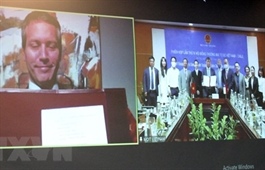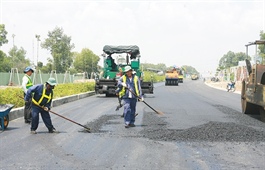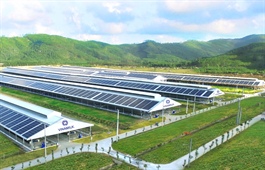Viet Nam should continue support for vulnerable groups to ensure growth: IMF official
Viet Nam should continue support for vulnerable groups to ensure growth: IMF official
Viet Nam will record positive economic growth in 2021, at about 6-7 per cent, if the country continues to support vulnerable groups in the economy and carries on its vaccination campaign, said Jonathan Ostry, Deputy Director of the Asia and Pacific Department of the International Monetary Fund (IMF). 
The Southeast Asian country needs to lay a foundation for strong growth in the mid-term, including ensuring sufficient revenue resources for infrastructure development and implementation of public investment, he said.
It is necessary for the nation to ensure a resilient financial system, and continue efforts to improve the investment climate, Ostry added.
Regarding a plan being drafted by the Vietnamese Government to assist enterprises during the pandemic, the IMF official said the country’s fiscal policy should be loosened to support economic activities, and limit negative impacts from the pandemic.
Policy adjustments depend largely on the speed of economic recovery at the global level, which faces a lot of uncertainties, he said.
Pointing out the weak uptake of tax deferrals in Viet Nam, particularly in the hardest-hit sectors of the economy, the IMF recommended the introduction of temporary corporate income tax (CIT) loss-carry backwards to improve firms’ cash flows, better targeting of temporary CIT reductions to benefit distressed but viable small and medium-sized enterprises, and the introduction of temporary provisions for accelerated depreciation or investment tax credits.
He said Viet Nam’s economic growth story in the past three decades is notable since it is sustainable and inclusive growth that helps improve local livelihoods.
Thanks to market-oriented reforms which enable improvements in the business climate, and the attraction of huge amounts of foreign direct investment, Viet Nam has risen from being in the group of the world’s poorest countries to gaining “middle-income” status.
The country should work to improve the business environment and ensure an equal playground, he said, adding this includes reforms geared towards simplifying and reducing the regulatory burden for domestic firms, easing entry costs for enterprises, continued reform of State-owned firms, and enhancing good governance.
Additionally, he suggested Viet Nam enhance human capital and technology access to boost labour productivity, which facilitates investments in more complex products that can gain a better competitive edge in the international market.

























